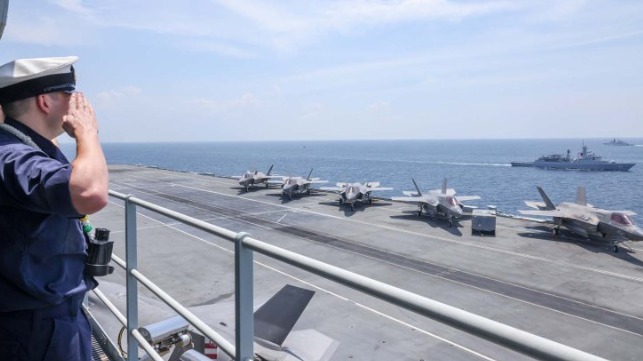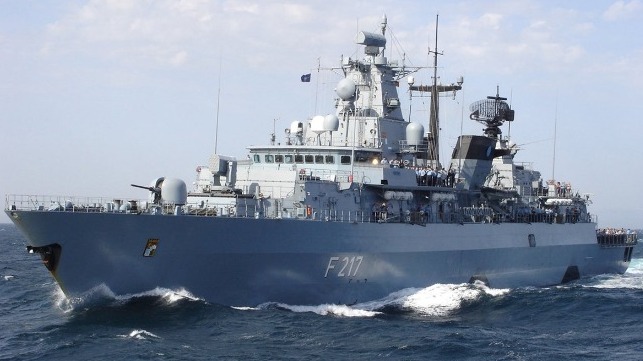WHO INVITED YOU
LOOKS LIKE NATO IN THE PACIFIC
Royal Navy Carrier Enters the Pacific for the First Time in Decades

The UK Royal Navy's first full-scale aircraft carrier in a generation has entered the Pacific, marking Great Britain's new commitment to maritime security in the Far East in an era of great power competition. Independent reports suggest that carrier HMS Queen Elizabeth has been operating in the South China Sea since last week.
"The arrival of the Carrier Strike Group in Southeast Asia is a clear sign that the UK is ready to work with friends and partners, new and old, to strengthen the security and freedoms upon which we mutually depend," said Commodore Steve Moorhouse, commander of the UK Carrier Strike Group, in a statement Thursday.
The task group, led by Queen Elizabeth, passed through the Strait of Malacca and met up with vessels of the Thai, Malaysian and Singaporean navies for passing exercises and maneuvers along the way. Meanwhile, the Royal Fleet Auxiliary tanker RFA Tidespring made a port call in Singapore to take on supplies.
"The Indo-Pacific is critical to the UK’s economy and security, and HMS Richmond is proud to be playing our part in building regional partnerships, particularly as the UK seeks to become an ASEAN dialogue partner in the future," said Cdr. Hugh Botterill, the commanding officer of HMS Richmond. "Though any direct engagement was curtailed due to the COVID-19 pandemic, we enjoyed this brief professional collaboration.”
HMS Queen Elizabeth passed through the Strait of Malacca with Malaysian frigate KD Lekiu before meeting up with Singapore frigate RSS Intrepid, corvette Unity and landing platform dock Resolution.
Queen Elizabeth is now headed north, accompanied by HMS Defender, according to the Royal Navy. The Chinese Foreign Ministry has reported that the carrier strike group kept its distance from Chinese-occupied islands while it was in the South China Sea; Beijing held up this decision as an endorsement of its disputed territorial claims and an example for others to follow.
“China hopes navy vessels of other nations abide by international law when sailing across the South China Sea, respect the rights and sovereignty of the coastal nations, and avoid actions that damage regional peace,” the ministry said.
German Frigate Departs for the South China Sea

On Monday, the German Navy dispatched the frigate Bayern on a long voyage to the South China Sea, showing its support for the multinational effort to offset Chinese expansionism in the region.
The trip will take seven months, and it will see Bayern joining a NATO exercise in the Mediterranean and the EUNAVOR anti-piracy mission off Somalia on her way east. She will call in Vietnam, South Korea, Japan and Australia in addition to transiting the South China Sea. China is not currently on Bayern's itinerary, and Chinese officials have said that they will not host the vessel unless Germany clarifies the frigate's mission.
Unlike U.S. Navy vessels, which periodically challenge Chinese maritime claims by passing close to Chinese-occupied islands, the Bayern is expected to stay near established shipping lanes. It is also expected to steer clear of the Taiwan Strait; U.S. Navy transits of the strait are widely interpreted as a message of support for an independent Taiwan, and they routinely draw criticism from Beijing.
"It's good to talk about our values, but it's even better to [show] it," said German Defence Minister Annegret Kramp-Karrenbauer in a statement. "Today the frigate Bayern is heading towards the Indo-Pacific - a sign of stability, prosperity and a rule-based, multilateral order . . . Together with our valued partners in the region, Germany is showing [its] presence in the Indo-Pacific and sets an example of solidarity."
While Bayern's mission is to send a message of opposition to China's sweeping maritime claims, some defense observers have expressed concern that the deployment could end up having the opposite effect. If Bayern should call in Shanghai before transiting the South China Sea - as has been previously discussed - it could be interpreted as a sign that Germany was asking Beijing's permission before entering contested waters.
"It illustrates [that] European naval deployments can actively undermine rather than help uphold international law or support a strategy of deterrence against China – in fact, they can even go so far as to strengthen Chinese territorial claims in Asia. Everything depends on the detail," wrote Chatham House senior fellow Hans Kundnani and Prof. Michito Tsuruoka of Keio University in a recent editorial.
No comments:
Post a Comment